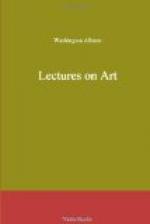We do not say that these eternal Ideas of Beauty, Truth, and Goodness will, strictly speaking, always act. Though indestructible, they may be banished for a time by the perverted Will, and mockeries of the brain, like the fume-born phantoms from the witches’ caldron in Macbeth, take their places, and assume their functions. We have examples of this in every age, and perhaps in none more startling than in the present. But we mean only that they cannot be forgotten: nay, they are but, too often recalled with unwelcome distinctness. Could we read the annals which must needs be scored on every heart,—could we look upon those of the aged reprobate,—who will doubt that their darkest passages are those made visible by the distant gleams from these angelic Forms, that, like the Three which stood before the tent of Abraham, once looked upon his youth?
And we doubt not that the truest witness to the common source of these inborn Ideas would readily be acknowledged by all, could they return to it now with their matured power of introspection, which is, at least, one of the few advantages of advancing years. But, though we cannot bring back youth, we may still recover much of its purer revelations of our nature from what has been left in the memory. From the dim present, then, we would appeal to that fresher time, ere the young spirit had shrunk from the overbearing pride of the understanding, and confidently ask, if the emotions we then felt from the Beautiful, the True, and the Good, did not seem in some way to refer to a common origin. And we would also ask, if it was then frequent that the influence from one was singly felt,—if it did not rather bring with it, however remotely, a sense of something, though widely differing, yet still akin to it. When we have basked in the beauty of a summer sunset, was there nothing in the sky that spoke to the soul of Truth and Goodness? And when the opening intellect first received the truth of the great law of gravitation, or felt itself mounting through the profound of space, to travel with the planets in their unerring rounds, did never then the kindred Ideas of Goodness and Beauty chime in, as it were, with the fabled music,—not fabled to the soul,—which led you on like one entranced?
And again, when, in the passive quiet of your moral nature, so predisposed in youth to all things genial, you have looked abroad on this marvellous, ever teeming Earth,—ever teeming alike for mind and body,—and have felt upon you flow, as from ten thousand springs of Goodness, Truth, and Beauty, ten thousand streams of innocent enjoyment; did you not then almost hear them shout in confluence, and almost see them gushing upwards, as if they would prove their unity, in one harmonious fountain?
But, though the preceding be admitted as all true in respect to certain “gifted” individuals, it may yet be denied that it is equally true with respect to all, in other words, that the Principle assumed is an inherent constituent of the human being. To this we reply, that universality does not necessarily imply equality.




